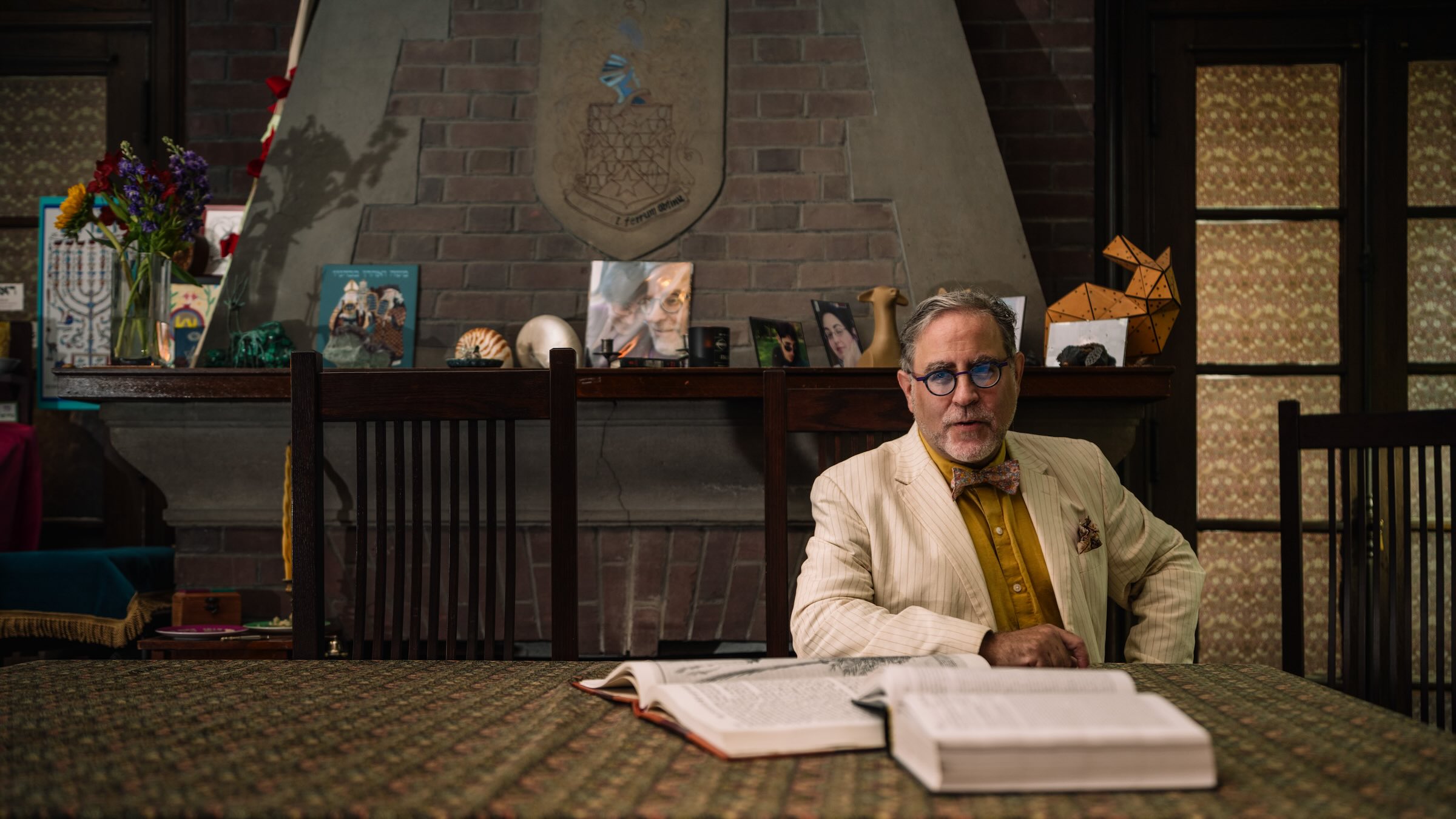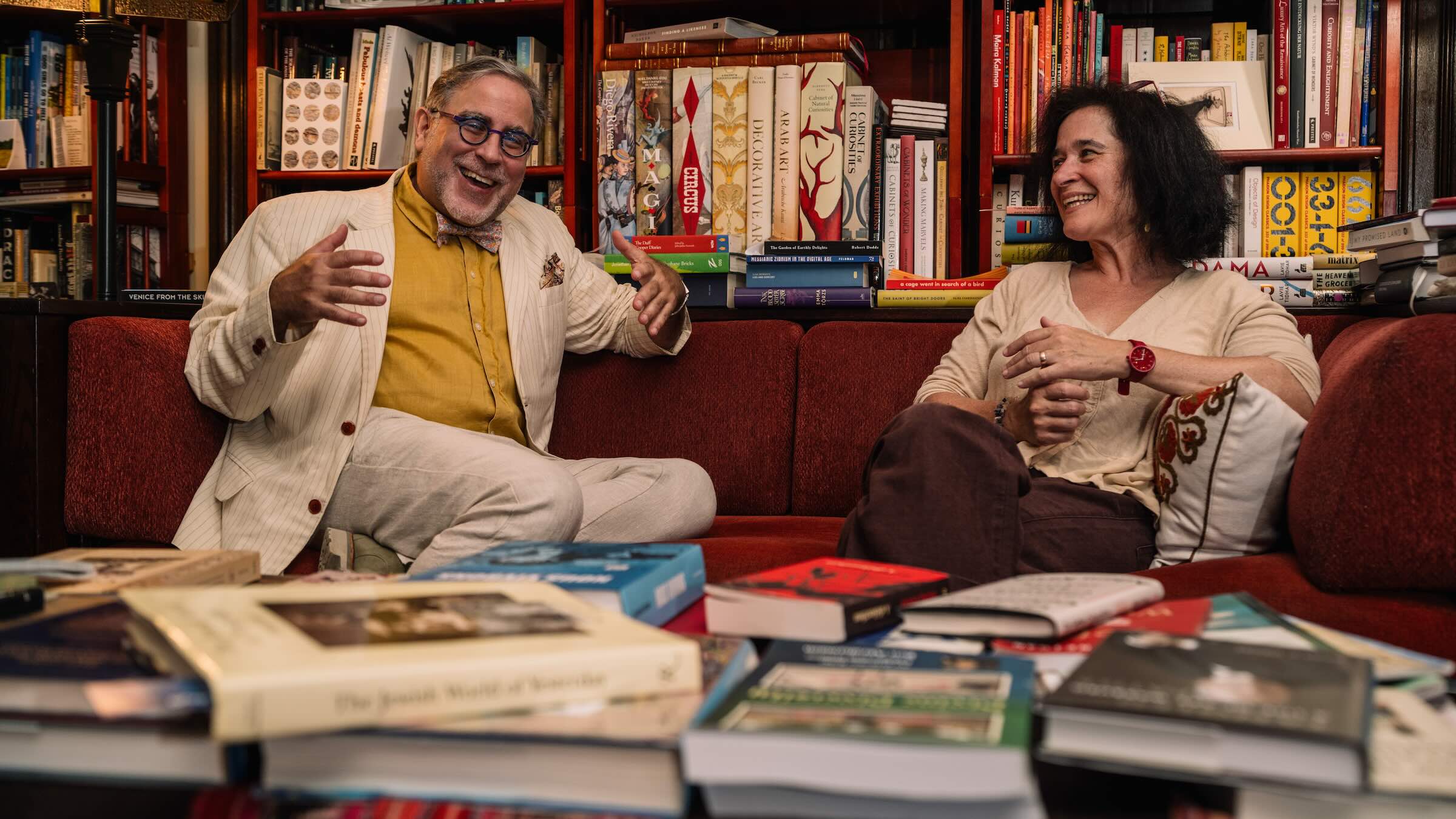Award-Winning Director of Jewish Studies Nurtures Students of All Backgrounds
Professor of Religion Marc Michael Epstein has long been recognized as a distinguished scholar. His most recent book, Skies of Parchment, Seas of Ink: Jewish Illuminated Manuscripts, won the 2015 National Jewish Book Award. More recently, the Orange County (CA) Community Scholars Program (CSP) honored Epstein with its highest award, the CSP Maimonides Award for Excellence in Jewish Learning, citing his decades of presentations in adult education classes for Jewish and non-Jewish students on a variety of topics.

However, as his students and virtually anyone who has ever met him can attest, simply describing Marc Epstein as a scholar of Jewish history and culture is woefully inadequate. As Director of Vassar’s Jewish Studies Program, he works with fellow faculty members—including his spouse, Professor Rabbanit Ági Vetö—to shape a vibrant and diverse curriculum for Vassar students, many of whom are not familiar with Judaism at all. “I like to think that Jewish Studies can provide a way of looking at issues facing all of humanity, starting with its ancient history and traditions and leading to horizons unknown,” Epstein said. “Jews were a tiny people who changed the world, and who have been making history ever since.”
Vetö, who also coordinates Vassar’s Hebrew Language Program, teaches courses in Hebrew Bible, Jewish law, the idea of the Land of Israel before the creation of the Jewish state, and a course that examines anti-Judaism and antisemitism, a topic that became particularly significant in the wake of the October 7, 2023 attack on Israel and the subsequent war in Gaza. “Students have a hard time talking about this, so it’s important that we help make them comfortable doing so,” she said.
But perhaps Epstein’s most significant impact on students’ lives doesn’t happen in the classroom but rather in his home adjacent to the campus where he and Ági Vetö host dinners and wide-ranging discussions, often two or three nights a week. “It’s something I’ve always done,” said Epstein, who earned his PhD at Yale and started teaching at Vassar in 1992. “I did it because some of my very best experiences in college involved getting to know my professors and being invited into their homes. We want our students to feel a connection and know that we will support them in whatever they are going through.

“We pick students up at the train station; we get their prescriptions filled at the pharmacy and talk to them any time they are in crisis,” Epstein continued. “We are here to listen. We’ve been through a lot ourselves, so we’re in a place where we can offer advice.”
Like many students, Zachary Cahn ’27 was first drawn to Epstein by his obvious intellectual prowess and enthusiasm. “I was raised in a Jewish household, but I wasn’t particularly observant, though Judaism was always an important part of my identity and heritage,” Cahn said. “I wanted to learn more about Judaism in an academic context when I got to college, so I went to a lecture Marc gave before classes began my first year, and after that experience, I immediately signed up for one of his courses, and I later took Ági’s course on antisemitism and anti-Judaism,” Cahn said. “I felt really welcome when I was first invited to their house. It’s a scary transition going to college and having their presence, their support, was incredibly impactful.”
One of Cahn’s classmates, Theo Burstyn-Paul ’27, said he had not planned on taking part in Jewish life on campus when he first enrolled, but that changed almost immediately when his roommate, Sean Miller ’27, returned from the lecture Epstein had given at the start of the semester. “Sean came back to the room and said, ‘This guy is incredible, we have to take his class,’” Burstyn-Paul said. “And Sean’s not even Jewish. He’s from a small town in New Hampshire, and I don’t think a single Jew lives there.”
Burstyn-Paul, who describes himself as a “Jewish agnostic,” said he has always felt safe on the Vassar campus, although he was affected by some events in the wake of the October 7 attacks in Israel. “Some of the language that was used in the protests on campus caused some anxiety, but I don’t think students have the intent of being antisemitic,” he said.
During those stressful moments, Epstein served as a thoughtful, calming presence, Burstyn-Paul said. “He’s someone who pushes you to think deeply, and he’s incredibly open to all views and beliefs; he just wants to foster your learning.”
Two Vassar alums who recently made a significant gift to the Jewish Studies Program, Judith and Edward Grinspan (both Class of 1974), said they too were captivated by Epstein’s warmth and enthusiasm as they were trying to decide how to commemorate their lifetime relationship with the College. “After October 7 happened, we wanted to do something to foster Jewish life on campus,” Judith Grinspan said. “We met Marc during our 50th reunion, and he invited us to his home for dinner. I was immediately struck by his intellectual power and his enthusiasm. He seems like one of those people who can engage with anyone.”
The Grinspans said they learned that Epstein often teaches courses that involve trips to Europe, so they decided to create a fund that would cover the costs of students who otherwise could not afford the trip. “We were just blown away by Marc, so we decided to make this gift,” she said.
Eloise Grossman ’25, a student who was enrolled in a class of Epstein’s last year that included a trip to Venice, echoed Grinspan’s comments about her professor’s warmth and enthusiasm. Grossman said she first met Epstein shortly after she transferred to Vassar from Northeastern University. “I wanted to take Marc’s class on Western mystical traditions, and I needed to find out if courses I had taken at Northeastern qualified as the necessary prerequisites,” she said. “When I contacted Marc, he wanted to know all about why I had transferred and started emailing me about other professors here that I might like. It was obvious he was really interested in me as a person, and my relationship with him and with Ági has grown ever since.”
“I wouldn’t say I have become more religious after meeting Marc,” she continued, “but I have become more interested in Jewish history and traditions, and as a result, I feel more connected to my own family.”
Epstein said proselytizing has never had a place in his home. “I’m 60, and I’m still developing my own religious beliefs,” he said. “If I’m changing, I can hardly ask my students to choose one particular path.”
Epstein smiled as he recalled the teachings of the 12th-century Jewish scholar after whom his recent award was named. “Maimonides called upon Jews to live a distinctively Jewish life enlivened by logic, pragmatism, and a profound sense of inquiry,” he said. “I like to think Ági and I can model how to walk in his footsteps—how to be proudly Jewish and fully in the world.”